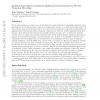Free Online Productivity Tools
i2Speak
i2Symbol
i2OCR
iTex2Img
iWeb2Print
iWeb2Shot
i2Type
iPdf2Split
iPdf2Merge
i2Bopomofo
i2Arabic
i2Style
i2Image
i2PDF
iLatex2Rtf
Sci2ools
CORR
2016
Springer
2016
Springer
Optimal Supervised Learning in Spiking Neural Networks for Precise Temporal Encoding
Precise spike timing as a means to encode information in neural networks is biologically supported, and is advantageous over frequency-based codes by processing input features on a much shorter time-scale. For these reasons, much recent attention has been focused on the development of supervised learning rules for spiking neural networks that utilise a temporal coding scheme. However, despite significant progress in this area, there still lack rules that are theoretically justified, and yet can be considered biologically relevant. Here we examine the general conditions under which optimal synaptic plasticity takes place to support the supervised learning of a precise temporal code. As part of our analysis we introduce two analytically derived learning rules, one of which relies on an instantaneous error signal to optimise synaptic weights in a network (INST rule), and the other one relying on a filtered error signal to minimise the variance of synaptic weight modifications (FILT rule)...
Related Content
| Added | 01 Apr 2016 |
| Updated | 01 Apr 2016 |
| Type | Journal |
| Year | 2016 |
| Where | CORR |
| Authors | Brian Gardner, André Grüning |
Comments (0)

